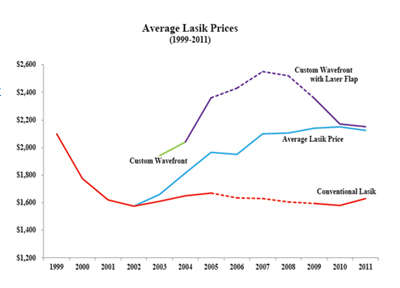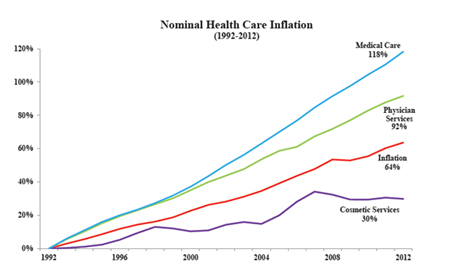

Americans see their doctors more than 1 billion times a year ― and spend nearly $300 billion on physician services ― but they rarely discuss the price of a given service with their physicians in advance of receiving treatment. It gets worse. Although only about 10 percent of health care expenditures are spent on physicians’ services, doctors are the gate keepers to virtually all care that is provided to patients ― including MRI scans, lab tests, hospital admissions and surgeries. Yet doctors rarely provide a list of prices for goods and services they provide or discuss the prices of the procedures they order. Patients don’t bother to shop for medical care, and doctors don’t advertise their prices because nearly 90 percent of patients’ tabs are paid with other people’s money.
However, when patients pay their own medical bills, they act like normal consumers ― comparing prices and looking for value. And when patients act like prudent consumers, doctors who want their patronage must respond by competing on prices, convenience and other amenities.
Consider cosmetic surgery, one of the few areas of medicine where consumers pay out of pocket. The inflation-adjusted price of cosmetic medicine actually fell over the past two decades — despite a huge increase in demand and considerable innovation [See Figure]. Since 1992:
- The price of medical care has increased an average of 118 percent.
- The price of physician services rose by 92 percent.
- The inflation rate, for all goods and services, as measured increased by 64 percent.
- Yet cosmetic surgery prices only rose only about 30 percent.
The price of cosmetic medicine was held in check by a variety of competitive forces: Doctors who perform cosmetic services quote package prices, and generally adjust their fees to stay competitive. The industry is constantly developing new products and services that expand the market and compete with older services. As more cash-paying patients demand procedures, doctors rush to provide them. There are few barriers to entry in cosmetic surgery. Any licensed physician can enter the field.
Entrepreneurial physicians are also on the lookout for new ways to market their services. Consider the ubiquitous deal-of-the-day emails, where Groupon and LivingSocial offer goods and services to subscribers at greatly reduced prices. These daily deal promoters offer numerous medical-related services, including Botox, corrective eye surgery, dental teeth cleaning, teeth whitening, laser hair removal, laser facial resurfacing, cosmetic fillers, spider vein and brown spot removal at highly discounted prices. This defies the conventional wisdom that a doctor would never advertise a bundled cash price — much less extend the offer to hundreds of thousands of random people sight-unseen. Yet the offers land in millions of email inboxes every day, and competition is fierce.
Consider botulism toxin injections, such as Botox and Dysport. According to surveys by the American Society of Plastic Surgeons, the average fee to administer botulism toxin was $369 in 2012, compared to $365 a dozen years earlier in 2000. Groupon and LivingSocial have occasionally offered Botox deals for as little as $99, with $149 quite common.
Another competitive service is laser skin resurfacing, which cost about $2,556 in 1996, according to the American Society of Plastic Surgeons. Physicians began offering less-invasive, fractional laser resurfacing that reduced recovery time. The cost of fractional laser skin resurfacing fell to $1,113 by 2012. Yet, couponing websites have offered numerous laser resurfacing deals for only $299. One Dallas-area Med Spa even offers this service, available with a one-year membership, for as little as $149 — a mere fraction of the cost elsewhere.
Wherever there is price competition, quality competition tends to follow. Take corrective eye surgery. From 1999 (when eye doctors began performing Lasik in volume) through 2011, the price of conventional Lasik fell about one-quarter due to intense competition. [See Figure] Eye surgeons who wanted to differentiate themselves from other surgeons, and charge more, began to provide more advanced Custom Wavefront Lasik technology using IntraLase (a laser-created flap). By 2011, the average price per eye for doctors performing Custom Lasik was about what conventional Lasik had been more than a decade earlier; but the quality is far better. Occasionally an eye surgeon will offer a daily deal at half this price.
through 2011, the price of conventional Lasik fell about one-quarter due to intense competition. [See Figure] Eye surgeons who wanted to differentiate themselves from other surgeons, and charge more, began to provide more advanced Custom Wavefront Lasik technology using IntraLase (a laser-created flap). By 2011, the average price per eye for doctors performing Custom Lasik was about what conventional Lasik had been more than a decade earlier; but the quality is far better. Occasionally an eye surgeon will offer a daily deal at half this price.
One criticism skeptics often voice in discussions about fostering patient consumerism is that a patient having a heart attack is not in a position to shop for the cheapest cardiac care from the back of an ambulance taking him to the emergency room. Few people would disagree. But only about $1 out of $20 is spent on patients who enter the health care system through the emergency room door.
Consider the experience of an insured patient whose doctor orders an abdominal CT scan. Receiving this service at a hospital outpatient department could cost the patient (or her health plan) nearly $3,000 depending on whether the patient’s deductible has been met. Yet this same service is available outside the hospital at a medical imaging center for prices that are often 85 percent less. Few health plans provide the tools for enrollees to compare prices and few patients have an incentive to ask about prices.
Doctors and hospitals don’t quote prices and don’t compete on price because most patients are largely insulated from the adverse effects of not making price comparisons and acting like consumers. Both economic studies and common sense confirm that people do not shop carefully and prudently when someone else is picking up the tab. The contrast between cosmetic surgery and other medical services is important. One sector has a competitive marketplace and stable prices. The other does not.
The medical marketplace should work more like the market for cosmetic surgery.
Study: The Market for Medical Care Should Work Like Cosmetic Surgery.









